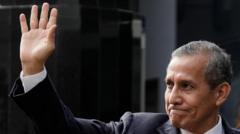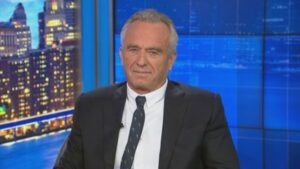Nelson Amenya, a Kenyan MBA student in France, has emerged as a key whistleblower by unveiling alleged corrupt practices surrounding a proposed $2 billion airport management deal with the Adani Group. His actions ignited a nationwide strike and resulted in Kenya's president announcing the cancellation of the deal amid rising tensions and safety concerns for Amenya.
Whistleblower Reforms: Nelson Amenya's Stand Against Corruption in Kenya

Whistleblower Reforms: Nelson Amenya's Stand Against Corruption in Kenya
Kenyan student Nelson Amenya's exposure of a controversial airport deal has sparked a national outcry for transparency, igniting a movement against corruption.
Article Text:
In a landmark move towards transparency in governance, Kenyan student Nelson Amenya has been celebrated as a whistleblower hero, raising critical questions about government dealings with private firms. The 30-year-old, currently studying for an MBA in France, has attracted significant attention due to his revelation regarding a controversial agreement involving the management of Jomo Kenyatta International Airport (JKIA).
The leak, which occurred in July, exposed a proposed $2 billion deal with India's Adani Group that aimed to lease JKIA for 30 years for its modernization and operations. Upon receiving the details, Amenya was struck by the potential implications of the agreement—namely, its apparent unfairness to Kenya where the majority of financial responsibility rested on the national government while the economic benefits would flow predominantly to the foreign multinational.
"My initial reaction was disbelief; I thought it was just another deal shrouded in secrecy," Amenya told reporters. However, as he scrutinized the documents, he became increasingly alarmed by what he perceived as a breach of public trust—a sentiment compounded by Kenya's troubled history with corruption.
Amenya became concerned that the deal could lock Kenya into a long-term commitment without adequate returns. His fears amplified when he discovered that the deal might obligate the country to subsidize the Adani Group if investment returns didn't meet expectations—a notion viewed as a betrayal by Amenya, who noted that key legal and procedural guidelines appeared to have been overlooked.
Despite the risks associated with blowing the whistle, including threats against his safety and potential career repercussions, Amenya ultimately decided to go public. "It felt like a responsibility I had to my nation," he said, emphasizing his commitment to ending corruption. Within days of his document release, outrage from citizens and airport workers prompted strike actions demanding the deal be terminated.
The incident gained further traction, ultimately leading to Kenyan President William Ruto publicly announcing the cancellation of the Adani agreements. This decision was fueled by a concurrent indictment against Gautam Adani by U.S. authorities for alleged bribery—an indictment that cast significant doubt on the integrity of the initial agreement.
As the news spread, Amenya expressed his emotional relief and triumph. "It was surreal; I had tears of joy. My actions finally realized a change.” However, he remained aware of the complexities surrounding his actions and the legal retaliation he is now facing, including defamation lawsuits from representatives of the Adani Group.
While Ruto's administration maintains that discussions to upgrade JKIA will continue, Amenya remains cautious about returning to Kenya. He has received warnings about potential consequences for his whistleblower actions and is currently raising funds for his ongoing legal battles.
“People like me shouldn’t stay silent. We are capable of leading change,” Amenya asserted, embodying courage and resilience in the face of adversity.
In a landmark move towards transparency in governance, Kenyan student Nelson Amenya has been celebrated as a whistleblower hero, raising critical questions about government dealings with private firms. The 30-year-old, currently studying for an MBA in France, has attracted significant attention due to his revelation regarding a controversial agreement involving the management of Jomo Kenyatta International Airport (JKIA).
The leak, which occurred in July, exposed a proposed $2 billion deal with India's Adani Group that aimed to lease JKIA for 30 years for its modernization and operations. Upon receiving the details, Amenya was struck by the potential implications of the agreement—namely, its apparent unfairness to Kenya where the majority of financial responsibility rested on the national government while the economic benefits would flow predominantly to the foreign multinational.
"My initial reaction was disbelief; I thought it was just another deal shrouded in secrecy," Amenya told reporters. However, as he scrutinized the documents, he became increasingly alarmed by what he perceived as a breach of public trust—a sentiment compounded by Kenya's troubled history with corruption.
Amenya became concerned that the deal could lock Kenya into a long-term commitment without adequate returns. His fears amplified when he discovered that the deal might obligate the country to subsidize the Adani Group if investment returns didn't meet expectations—a notion viewed as a betrayal by Amenya, who noted that key legal and procedural guidelines appeared to have been overlooked.
Despite the risks associated with blowing the whistle, including threats against his safety and potential career repercussions, Amenya ultimately decided to go public. "It felt like a responsibility I had to my nation," he said, emphasizing his commitment to ending corruption. Within days of his document release, outrage from citizens and airport workers prompted strike actions demanding the deal be terminated.
The incident gained further traction, ultimately leading to Kenyan President William Ruto publicly announcing the cancellation of the Adani agreements. This decision was fueled by a concurrent indictment against Gautam Adani by U.S. authorities for alleged bribery—an indictment that cast significant doubt on the integrity of the initial agreement.
As the news spread, Amenya expressed his emotional relief and triumph. "It was surreal; I had tears of joy. My actions finally realized a change.” However, he remained aware of the complexities surrounding his actions and the legal retaliation he is now facing, including defamation lawsuits from representatives of the Adani Group.
While Ruto's administration maintains that discussions to upgrade JKIA will continue, Amenya remains cautious about returning to Kenya. He has received warnings about potential consequences for his whistleblower actions and is currently raising funds for his ongoing legal battles.
“People like me shouldn’t stay silent. We are capable of leading change,” Amenya asserted, embodying courage and resilience in the face of adversity.




















